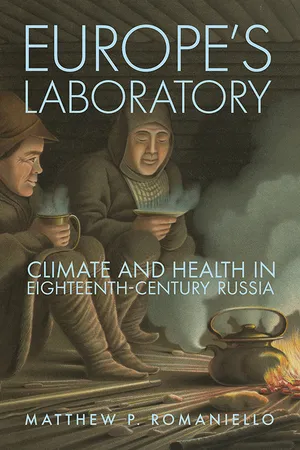
Europe's Laboratory
Climate and Health in Eighteenth-Century Russia
- English
- ePUB (mobile friendly)
- Available on iOS & Android
About this book
Europe's Laboratory is a history of eighteenth-century naturalists and physicians who were involved in the creation of a classification system for the people of the Russian Empire. These Enlightened scholars traveled through Russia describing its people, landscape, and customs. In an era when climate was seen as a significant factor affecting health and bodies, these men wondered: How did the Russians, a "cold" people—phlegmatic or melancholic, according to humoral theory—manage an empire?
Russia's empire, as Matthew P. Romaniello shows, contradicted the medical knowledge reflecting centuries of experimentation and practice. In solving this riddle, naturalists and physicians would unlock the secret of Russia's success and create a typology of imperial bodies, a guide toward managing the empire's diversity, to prepare Russia for greater successes in the nineteenth century. Rather than an underpopulated region of unambitious people, eighteenth-century Russia was a dynamic empire that mastered skills to support settler colonialism in climates unfamiliar to other Europeans. Europe's Laboratory makes a significant contribution to the most understudied era of Russian history while engaging the broader, global debates on the formation of race theory in colonial contexts.
Frequently asked questions
- Essential is ideal for learners and professionals who enjoy exploring a wide range of subjects. Access the Essential Library with 800,000+ trusted titles and best-sellers across business, personal growth, and the humanities. Includes unlimited reading time and Standard Read Aloud voice.
- Complete: Perfect for advanced learners and researchers needing full, unrestricted access. Unlock 1.4M+ books across hundreds of subjects, including academic and specialized titles. The Complete Plan also includes advanced features like Premium Read Aloud and Research Assistant.
Please note we cannot support devices running on iOS 13 and Android 7 or earlier. Learn more about using the app.
Information
Table of contents
- Cover Page
- Title Page
- Contents
- List of Abbreviations
- Note on Transliteration, Spelling, and Dates
- Introduction
- PART I. STRUCTURING KNOWLEDGE
- PART II. APPLYING KNOWLEDGE
- PART III. CHALLENGING KNOWLEDGE
- Acknowledgments
- Notes
- Bibliography
- Index
- Series Page
- Copyright Page